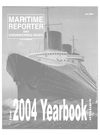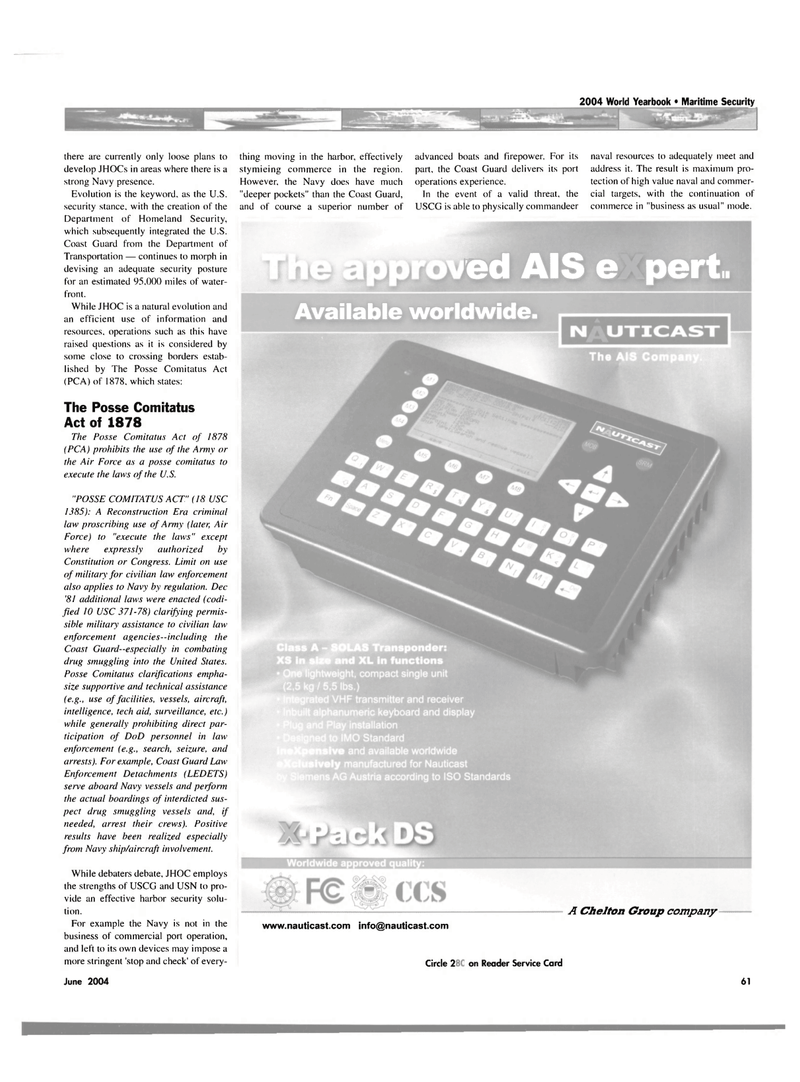
Page 61: of Maritime Reporter Magazine (June 2004)
Annual World Yearbook
Read this page in Pdf, Flash or Html5 edition of June 2004 Maritime Reporter Magazine
2004 World Yearbook • Maritime Security there are currently only loose plans to develop JHOCs in areas where there is a strong Navy presence.
Evolution is the keyword, as the U.S. security stance, with the creation of the
Department of Homeland Security, which subsequently integrated the U.S.
Coast Guard from the Department of
Transportation — continues to morph in devising an adequate security posture for an estimated 95,000 miles of water- front.
While JHOC is a natural evolution and an efficient use of information and resources, operations such as this have raised questions as it is considered by some close to crossing borders estab- lished by The Posse Comitatus Act (PCA) of 1878, which states:
The Posse Comitatus
Act of 1878
The Posse Comitatus Act of 1878 (PCA) prohibits the use of the Army or the Air Force as a posse comitatus to execute the laws of the U.S. "POSSE COMITATUS ACT" (18 USC 1385): A Reconstruction Era criminal law proscribing use of Army (later, Air
Force) to "execute the laws" except where expressly authorized by
Constitution or Congress. Limit on use of military for civilian law enforcement also applies to Navy by regulation. Dec '81 additional laws were enacted (codi- fied 10 USC 371-78) clarifying permis- sible military assistance to civilian law enforcement agencies--including the
Coast Guard—especially in combating drug smuggling into the United States.
Posse Comitatus clarifications empha- size supportive and technical assistance (e.g., use of facilities, vessels, aircraft, intelligence, tech aid, surveillance, etc.) while generally prohibiting direct par- ticipation of DoD personnel in law enforcement (e.g., search, seizure, and arrests). For example, Coast Guard Law
Enforcement Detachments (LEDETS) serve aboard Navy vessels and perform the actual boardings of interdicted sus- pect drug smuggling vessels and, if needed, arrest their crews). Positive results have been realized especially from Navy ship/aircraft involvement.
While debaters debate, JHOC employs the strengths of USCG and USN to pro- vide an effective harbor security solu- tion.
For example the Navy is not in the business of commercial port operation, and left to its own devices may impose a more stringent 'stop and check' of every- thing moving in the harbor, effectively stymieing commerce in the region.
However, the Navy does have much "deeper pockets" than the Coast Guard, and of course a superior number of advanced boats and firepower. For its part, the Coast Guard delivers its port operations experience.
In the event of a valid threat, the
USCG is able to physically commandeer naval resources to adequately meet and address it. The result is maximum pro- tection of high value naval and commer- cial targets, with the continuation of commerce in "business as usual" mode. ed AIS e [pert.
Available worldwide.
A Che J ton Group company - [email protected]
Circle 257 on Reader Service Card
June 2004 61

 60
60

 62
62
